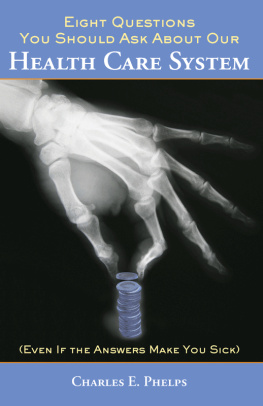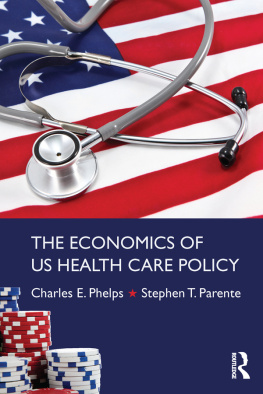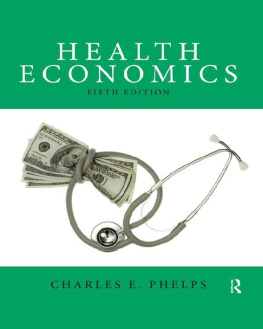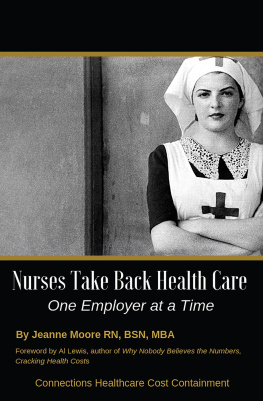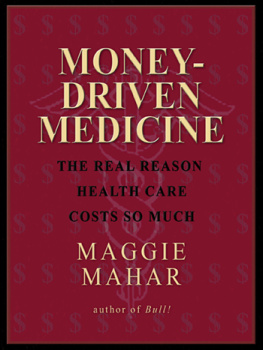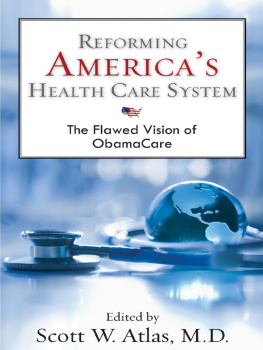
The Hoover Institution gratefully acknowledges the following individuals and foundations for their significant support of the Working Group on Health Care Policy and this publication:
LYNDE AND HARRY BRADLEY FOUNDATION
EIGHT QUESTIONS YOU SHOULD ASK ABOUT OUR HEALTH CARE SYSTEM
(EVEN IF THE ANSWERS MAKE YOU SICK)
Charles E. Phelps
HOOVER INSTITUTION PRESS
Stanford University
Stanford, California
The Hoover Institution on War, Revolution and Peace, founded at Stanford University in 1919 by Herbert Hoover, who went on to become the thirty-first president of the United States, is an interdisciplinary research center for advanced study on domestic and international affairs. The views expressed in its publications are entirely those of the authors and do not necessarily reflect the views of the staff, officers, or Board of Overseers of the Hoover Institution.
www.hoover.org
Hoover Institution Press Publication No. 581
Hoover Institution at Leland Stanford Junior University, Stanford, California, 943056010
Copyright 2010 by the Board of Trustees of the Leland Stanford Junior University
All rights reserved. No part of this publication may be reproduced, stored in a retrieval system, or transmitted in any form or by any means, electronic, mechanical, photocopying, recording, or otherwise, without written permission of the publisher and copyright holders.
First printing 2010
16 15 14 13 12 11 10 9 8 7 6 5 4 3 2 1
Manufactured in the United States of America
Illustration on page 106 by Taylor Jones.
Hoover Institution Press has no responsibility for the persistence or accuracy of URLs for external or third-party internet websites referred to in this publication, and does not guarantee that any content on such websites is, or will remain, accurate or appropriate.
The paper used in this publication meets the minimum Requirements of the American National Standard for Information SciencesPermanence of Paper for Printed Library Materials, ANSI/NISO Z39.481992. 
Cataloging-in-Publication Data is available from the Library of Congress
ISBN-13: 978-0-8179-1054-9 (cloth. : alk. paper)
ISBN-13: 978-0-8179-1056-3 (e-book)
To Daleour time has just begun, once again.
CONTENTS
CHAPTER ONE
How Did We Get into this Mess, and Why Will It Get Worse?
CHAPTER TWO
When Is Less Insurance Better than More?
CHAPTER THREE
How Does Good Technology Go Bad? A Tale of Two Cities (and More)
CHAPTER FOUR
Why Is the Employer-Paid Foundation of Health Insurance Riddled with Termites?
CHAPTER FIVE
Do Dollars Distort Doctors Decisions?
CHAPTER SIX
Why Are We All Killing Ourselves?
CHAPTER SEVEN
Why Is Our K12 Educational System a Public Health Menace?
CHAPTER EIGHT
Where Does the Congress Miss Opportunities and Hit Potholes?
FOREWORD
Remarkable advances in health care have occurred during the past sixty years. Dramatic improvements in diagnostic and therapeutic strategies, as well as significant advances in medical technologies, pharmaceuticals, and surgical procedures have extended the length of life and greatly improved its quality as well. For example, progress in the treatment of cardiovascular disease has reduced, by more than a 50 percent, the U.S. death rate from heart attacks accounting for nearly all the increases in the expected life-span in the United States since 1950.
Despite such extraordinary progress, however, U.S. health care faces serious challenges. The problem is not so much that health care spending is high, but that a significant portion of that spending fails to provide good value. As spending grows, an increasing number of people are unable to afford health insurance. The fiscal burden of federal and state health care entitlement programs, such as Medicare and Medicaid, can no longer be sustained without either deep reductions in other public programs or sharply higher taxes. Diverting both public and private resources from more productive uses has become a serious problem.
The debate over the direction of U.S. health care policy is occupying center stage in the domestic policy arena now and will so during the coming years. The promise of future medical advances stemming from the mapping of the human genome, nanotechnology, and other innovations is bright. But progress will require us to transcend the terms of the current debate, which are often expressed as the competing goals of universal insurance and cost control. The fundamental challenge is to devise public policies that enable more Americans to get better value for their health care dollar and foster appropriate innovations that extend and improve life. Key principles that guide policy formation should include the central role of individual choice and competitive markets in financing and delivering health services, individual responsibility for health behaviors and decisions, and appropriate guidelines for government intervention in health care markets.
The current core membership of the Hoover Institutions Working Group on Health Care Policy includes Scott W. Atlas, John F. Cogan, R. Glenn Hubbard, Daniel P. Kessler, Mark V. Pauly, and Charles E. Phelps.
JOHN RAISIAN
Tad and Diane Taube Director,
Hoover Institution, Stanford University Stanford, California
PREFACE
First, a couple of things that this book does not do. It does not comment specifically on current legislation, still under debate in the House and Senate as this book goes to press in early 2010, except for noting sins of commission and omission in the final chapter. In addition, the book focuses entirely on the U.S. health care system, albeit with some comparisons to other nations to put our data into context.
Second, this book does not offer my own recommendations (and the logic underlying them) for a proper fix for the system. I suspect that the reader can tease out my preferences, which would include elimination of the tax subsidy for employer-paid insurance, an emphasis on high-deductible plans such as Health Savings Accounts (HSAs), and a massive effort to deal with the problems of obesity, tobacco, and alcohol abuse.
What do I intend to accomplish with this book? I hope it will help intelligent and interested citizens to become more informed about important economic issues that are central to fixing our health care system. I also hope it will be accessible to those without formal economic training, while at the same time aiding and provoking serious discussion about these issues.
Charles E. Phelps
Gualala, California
March 2010
ACKNOWLEDGMENTS
I extend my appreciation to the Hoover Institution at Stanford University for making this book possible. I particularly thank John Cogan for the lead role he played in this endeavor; Dan Kessler for very helpful comments on a draft; and John Raisian for his assistance in making it happen.
I have also received valuable comments on an earlier draft from many friends whom I wish to acknowledge, especially Bruce Bueno de Mesquita (NYU and Hoover Institution), Debbie Freund (Syracuse University), Victor Fuchs (Stanford), Tom Jackson (University of Rochester), Andy Markovits (University of Michigan), and my brothers, Hugh Phelps, M.D., and especially Lew Phelps.
CHAPTER 1

